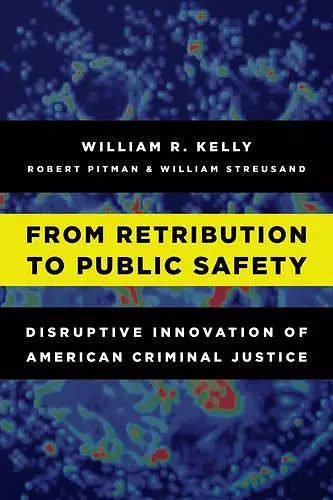From Retribution to Public Safety
Disruptive Innovation of American Criminal Justice
William R Kelly author Robert Pitman author William Streusand author
Format:Hardback
Publisher:Bloomsbury Publishing PLC
Published:25th May '17
Currently unavailable, and unfortunately no date known when it will be back

Over the past fifty years, American criminal justice policy has had a nearly singular focus – the relentless pursuit of punishment. Punishment is intuitive, proactive, logical, and simple. But the problem is that despite all of the appeal, logic, and common sense, punishment doesn't work. The majority of crimes committed in the United States are by people who have been through the criminal justice system before, many on multiple occasions.
There are two issues that are the primary focus of this book. The first is developing a better approach than simple punishment to actually address crime-related circumstances, deficits and disorders, in order to change offender behavior, reduce recidivism, victimization and cost. And the second issue is how do we do a better job of determining who should be diverted and who should be criminally prosecuted.
From Retribution to Public Safety develops a strategy for informed decision making regarding criminal prosecution and diversion. The authors develop procedures for panels of clinical experts to provide prosecutors with recommendations about diversion and intervention. This requires a substantial shift in criminal procedure as well as major reform to the public health system, both of which are discussed in detail.
Rather than ask how much punishment is necessary the authors look at how we can best reduce recidivism. In doing so they develop a roadmap to fix a fundamentally flawed system that is wasting massive amounts of public resources to not reducing crime or recidivism.
Sociologist Kelly, Texas district judge Pitman, and psychiatrist Streusand provide a logical, noteworthy critique of a criminal justice system that continues to maintain high recidivism rates (approximately 65 percent), which exposes hundreds of thousands to victimization and results in exorbitant expenses in direct criminal justice costs (approximately $270 billion yearly). The authors also contend that tough-on-crime policies and the war on drugs have consumed approximately $2 trillion of public money. Their argument is that since its inception, punishment for crime committed does not work, largely because an inventory of its clientele (prisoners) shows multiple disorders, deficits, impairments, and conditions, such as intellectual deficiencies, drug addiction, neurodevelopmental problems, and mental illness that in many cases have caused or strongly affected criminal behavior. Overall, the authors' primary focus is to develop a better approach than to simply punish and address recidivism, victimization, and the staggering costs citizens pay for incarceration. Two suggested changes include determining criminal intent at the onset with a clear option to divert disordered offenders into rehab to directly confront and ameliorate the problematic behavior largely responsible for offending. Well written and argued with an overabundance of methods for improving the negative outcomes of imprisoning offenders.
Summing Up: Recommended. Upper-division undergraduates and above.
From Retribution to Public Safety is a refreshing and important contribution to the criminal justice reform discourse. * New York Journal of Books *
From Retribution to Public Safety highlights a critical problem that plagues criminal justice -- a reliance on get-tough policies that do little to address the causes of crime and that therefore do little to reduce it. Retribution will always play a role in responses to crime. But Kelly and colleagues draw on state-of-the-art research to argue convincingly that only a dramatic shift to targeting the causes of offending offers hope for improving public safety. As the nation once again contemplates how best to reduce crime, this book should be required reading for policymakers and, indeed, for anyone interested in smart justice. -- Daniel P. Mears, Professor of Criminology at Florida State University
In an innovative and compelling analysis, William Kelly and colleagues show us why the retributivist paradigm has proven bankrupt: it is blind to the disorders that underlie crime and the responses needed to curtail them. In a post-factual era, these are stubborn realities that policymakers ignore that at our peril.. Wonderfully written, this is a book that scholars will learn from and that is ideal for classroom use. -- Francis T. Cullen, Distinguished Research Professor Emeritus, University of Cincinnati
Challenging the status quo is never easy or popular yet William Kelly and his colleagues have challenged the conventional thinking about crime and punishment and have provided a road map for making the justice system more humane and less punitive. This book should be read by anyone interested in learning more about the issues that many of our fellow citizens face as they confront a system that has lost its way. -- Edward Latessa, Professor, School of Criminal Justice, University of Cincin
ISBN: 9781442273887
Dimensions: 237mm x 156mm x 23mm
Weight: 494g
234 pages